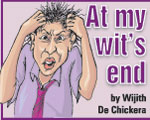Good news, bad luck and ugly Christmas
View(s):There is so much good news today that the mind boggles. If one can imagine it, one can believe it. There is peace on the political front, plenty of socio-economic development, progress on cultural unification. At Christmas, even these great projects pale in comparison to the grand enterprise of commerce – green in palm, purse, and pocket.

Good news is the all-new national product. And its provenance and purpose are evident everywhere. Good news is the brainchild of the incumbent administration, its largesse is distributed far and wide at the will and pleasure of the regime, and there is prosperity for those with whom the powers that be are pleased. But for the niggling problems on the borders of the erstwhile republic, this nascent empire would be utopia indeed.
At home there is no little tension, because the golden bough of the law has snapped off like a semi-rotten twig from the gilded vine of the government. The bitter fruit of discontent has been cast among the ruling demigods, like some apple of discord. When there is no agreement between scoundrels, no honour among thieves, there is bound to be falling out – from which fallout, the resultant fall has felled public confidence in the branches of the state’s sceptred tree.
But the people as a mass are not un-amused en masse. They have bread; and if they lack cake, at least they have a three-ringed circus: under the canopy of exec, legis-la-las, and judicious-self-righteousness. There are clowns to tickle, carnivals to titillate, and chariot-races to thrill. If only the price of petrol could be reduced during the season as a gesture of the rulership’s magnanimity, all would be well again. If only the people of every stripe and persuasion would be permitted their empty pleasures – from cosmopolitan cocktail circuits to provincial UFO pursuits – all would be well again in cloud-cuckoo-land.
There is always the good, the bad, and the ugly in any modern democracy or even erstwhile republic. When the dominant mode of governance approximates a benevolent (shall we say) tyranny – we mean that in the nicest possible way, dears – then the mix can get a little strong for plebeians or strange for even jaded patricians. All you have to do to eschew the sterling strains of propaganda (issuing from those heralds of the gods of this age) is to attune your inner ear to the ancient story that is told… and retold at Christmas-time… and is still so little understood.
Firstly, that the good news does not come to native kings (Herod), sycophantic court officials (priests/Pharisees), and far-off benign-malign passive-aggressive emperors (the Caesar family). Instead, the heralds of the gospel announce the glad tidings of great joy to a social non-entity of a young woman (unmarried Mary), a righteous but similarly anonymous older man (Joe Q. Public) betrothed to her, and the most despised social classes of the time (some uncouth Judean shepherds). And the annunciation, when it is made, is made in the language used to trumpet the good news blared out by Caesar’s propaganda machine (the euangelion is thus a polemic against worldly power). Also, it is announced not in city, temple, palace or praetorium; but somewhere out in the countryside. This truth must challenge those in positions of any sort of power this Christmas.
Secondly, that what appears to be inordinately bad luck accompanies the in-breaking of another, other-worldly, kingdom into this world. The king and court were greatly troubled by the Birth of the Baby in Bethlehem, and the great township of his ancestor David (Jerusalem) was in an uproar at the enquiry of the wise men from the east (not China, nor India) where the real King of the Jews was. Not traffic- and shopping- and partying-tumult, but the trauma of possible political upheaval; and the impending tragedy of Herod’s slaughter of the innocents. (Jesus would later say he comes to bring a sword, albeit one more peaceful than the false peace of the Pax Romana.)
Such a reality can hardly comfort the unwitting disturbed this Christmas – unless the disturbed are intentionally comforted by the willing players in the drama.
Thirdly, that the first Christmas was a very ugly affair for those who were elected to hear its bad news (We have all sinned) and know that its good luck (therefore unto us is born a Saviour) would pierce their lives and un-piece their destinies. The children of the chosen people wept and wailed in the wake of the infanticide sprung upon them in the aftermath of the Magi’s undiplomatic visit, and no platitudinous prophecy could comfort Rachel.
The young couple selected to care for and cherish the Christ-child became the world’s first best-known international refugees in the Common Era – as the epoch after the Advent is called by those who cannot bring themselves to acknowledge that He clove history in two irrevocable halves. The wise men, being warned in a dream, fled the potentially fatal wrath of worldly powers wronged.
Lastly, but by no means least, in our day and age, good news and bad luck and ugly realities characterize our Christmas. Night races that feed no one but the empty; all-day rain killing scores, making scores more go missing, and displacing dozens of thousands. And we have no time or space or energy the list the rest of the lost in the midst of the mindless chaos that is the cosmopolitan, pluralistic, empire-sustaining season. Every one of us alive here and now will be held accountable by how we respond to the story of our late great country. And that is what makes Christmas good, bad, and ugly.
Follow @timesonlinelk
comments powered by Disqus


















